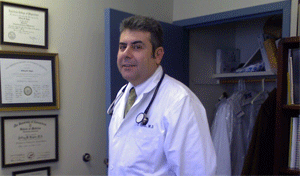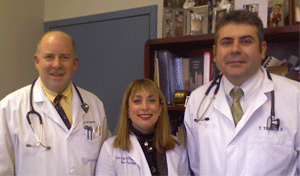Journey of an M.D. from Kars to Newington, Connecticut
- Written by Duygu Uckun
- Published in Health
By Duygu Uckun
This email address is being protected from spambots. You need JavaScript enabled to view it. -
Dr. Turgut Yetil has been practicing internal medicine in Newington, Connecticut for 12 years now. He has an extremely busy working schedule; being affiliated with three different medical institutions, he is sometimes on call 7 days of week - just like many other medical doctors in the United States. What distinguishes him from many others however, is, his story starts in a wood stove heated room in a small Anatolian city, Kars.
This email address is being protected from spambots. You need JavaScript enabled to view it. -
Dr. Turgut Yetil has been practicing internal medicine in Newington, Connecticut for 12 years now. He has an extremely busy working schedule; being affiliated with three different medical institutions, he is sometimes on call 7 days of week - just like many other medical doctors in the United States. What distinguishes him from many others however, is, his story starts in a wood stove heated room in a small Anatolian city, Kars.

Dr. Turgut Yetil.
Today he's the partner of a practice that is responsible for providing health care services to 15,000 in Connecticut - a rather prosperous state with the highest per capita income in the country. We asked Dr. Yetil about being an M.D. in the United States, the health system, advice for new-comers to the field, as well as his own personal journey in the profession.
Dr. Yetil, how long have you practicing medicine in the U.S.? Have you practiced medicine in Turkey? Could you tell us your first days as a doctor, and your experiences?
I graduated from medical school in 1987. Istanbul University Medical School (Çapa Tıp) was one of two schools of that were popular in Istanbul. After graduation I was appointed to the city of Kars through the obligatory service arrangement which was in effect at the time. Between working as a medical doctor for the Kars dept of education and doing a residency in family medicine in Istanbul, I spent three years in Turkey.
My first days after graduating medical school were some of the more exciting days of my life. The bus trip to Kars was long but not boring thanks to a new military recruit who was also going to his assignment for the first time. Being in the middle of January and one of the coldest years, I had asked the Kars taxi driver to make sure to take me to a centrally heated hotel. Well I ended up in a wood stove room that dwindled away to leave me sleeping in minus 40 degrees. The hotel owner new the taxi driver well. It figures. For the next year and a half I worked in new and relatively luxurious clinics with two other doctors. Lots of long lines was the hall mark of medicine in Turkey. It was fun visiting village schools for medical services. The city was a beautiful historical place with a river passing through and a fort on top of a central hill. I enjoyed it.
How long have you been living in the U.S.? Could you tell us about your first days in the U.S., and the process that you have gone through in order to practice medicine in the U.S.? Was language a challenge for you? Was your training in medicine sufficient?
After applying and passing the qualification exams in the U.S., I went through a matching process which involved interviews in medical schools for an internal medicine residency program. I matched with University of Connecticut Internal medicine residency program and stayed in the area after graduation. I am part of a single specialty group of two doctors and one advanced nurse practitioner for the past 12 years.
Regarding the language barrier, although I had no language problems thanks to my childhood in Australia [Dr. Yetil lived in Australia between ages 6-12 as his parents were included in the first wave of immigrant workers in 1960s], it took some getting used to the US medical system. First of all the responsibilities of the doctors in the U.S. were dispersed between ancillary groups, such as enhanced nursing responsibilities, phlebotomists, lab technicians, nurses aides, transportation, voluntary personnel etc. This gave the whole process of patient care a smooth flow. Another significant difference was the level of communication between all personnel. This was far advanced than Turkey in the U.S. Finally I realized that practical, “hands on” medicine was much more emphasized in the U.S. schools. This was thanks to the ratio of two or three residents/students to educators compared to the 15 to one ratio of my time in Turkey.
Could you tell us more about your transition to work as a doctor in the States?
My transition to working after residency was rather easy. I had an offer to join one of the local doctors in his practice. I was initially salaried for two years. This allowed me to have an income while I was building up my practice. Subsequently I joined the practice as a partner. Things have been busy ever since.
What are the advantages of having your undergraduate medicine education in Turkey?
I think my advantage of being a foreign medical graduate was to better understand and communicate with the immigrant population of Connecticut. Being able to help the local Turkish community is also rewarding.
Could you describe a typical day at the office?
On a typical day I round on my patients in the hospital, followed by seeing patients in the office. Our office patient census is around 15,000. In a busy day I see about 35 to 40 patients. It averages out to be 25 – 30 patients a day. I also get to see nursing home residents once or twice a week. Doing part time hospice work gives me the opportunity to work with hospice nurses, clerics and end of life issues [hospice: a program of medical and emotional care for the terminally ill.]
Do you come across Turks often at work? You do not have an accent; do your colleagues realize you are Turkish?
I can’t say I don’t have an accent. It shifts subtly between New York and British [due to Australia years.] But yes, I don’t have a Turkish accent except when speaking Turkish.
What are your thoughts on the health care system in the U.S.? We know the U.S. is not a social state in the classical sense, can you say that citizens have access to quality health service?
It’s not a secret that the health system in the U.S. is not perfect. There are over 40 million people uninsured and much, much more that are under insured. This is in the face of budget breaking inflation in the health care industry. It’s in dire need of fixing, starting with capping the liability insurance burden on doctors. One thing that’s positive is that once you have insurance you do get high quality care. This includes having good quality and fast service.

Dr. Yetil is the partner of a practice that is responsible for providing health care services to 15,000 in Connecticut.
Do you think it is an efficient system? Could you evaluate this from the viewpoint of doctors and patients?
Health insurance is very complex in the U.S. There are too many insurance companies that offer a myriad of various insurance plans. To top it all the plans keep changing frequently so that no one is sure what their plan exactly offers. If you’re not a lawyer that reads the fine prints in the plans, you may be stuck with big unpaid bills. Not even the doctors can keep up with which medications are covered under which insurance plans. The whole industry is very expensive to run.
For the doctors, technology is what runs up the price on health care. Becoming more efficient requires electronic gadgets and soft ware programs which cost a lot.
What is your advice for those who want to practice medicine in the U.S.?
I enjoy being a medical doctor in the U.S. very much. I get to be a doctor without worrying about availability of technical, social and financial services. Abundance of support staff makes life easier. First step of practicing medicine here is to take the foreign medical graduate exams step one, step two and step three (Preclinical and clinical sciences.) Once the first two tests are passed you can apply for the matching program for residency. A diploma and the curriculum of your medical school will be required for the application process. It’s not often that we see Turkish Doctors here. I think the language barrier has been a major problem in the past. Maybe proximity to Europe also makes the U.S. a second degree choice for Turkish graduates.
Thank you for your time Dr. Yetil. It was nice talking to you.
Thank you this interview Duygu. I rather enjoyed it.
Last modified onSaturday, 06 May 2017 10:07
